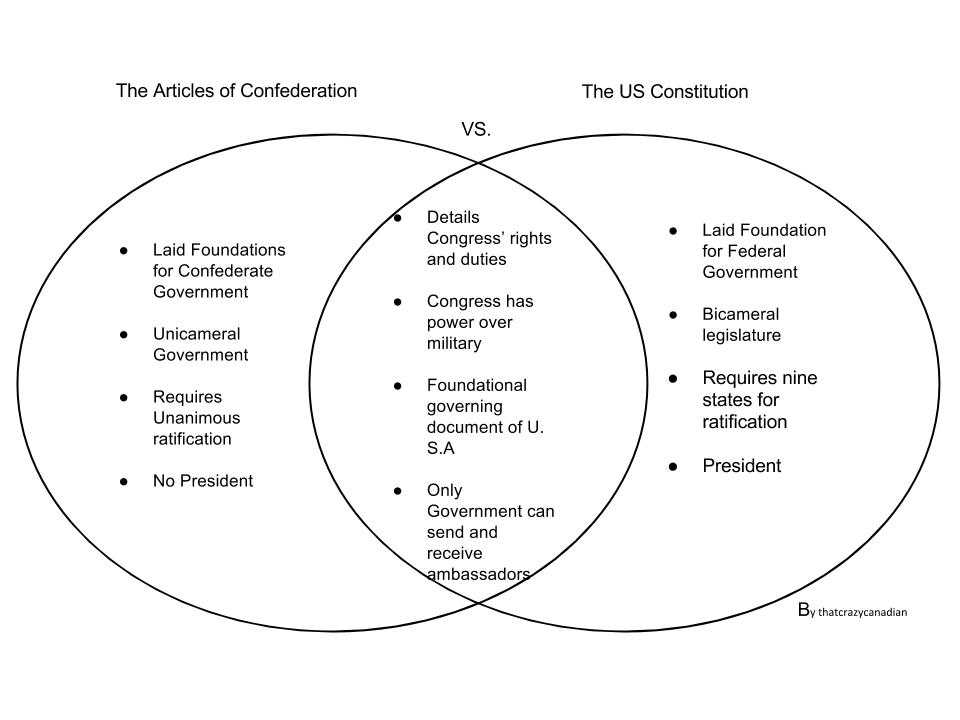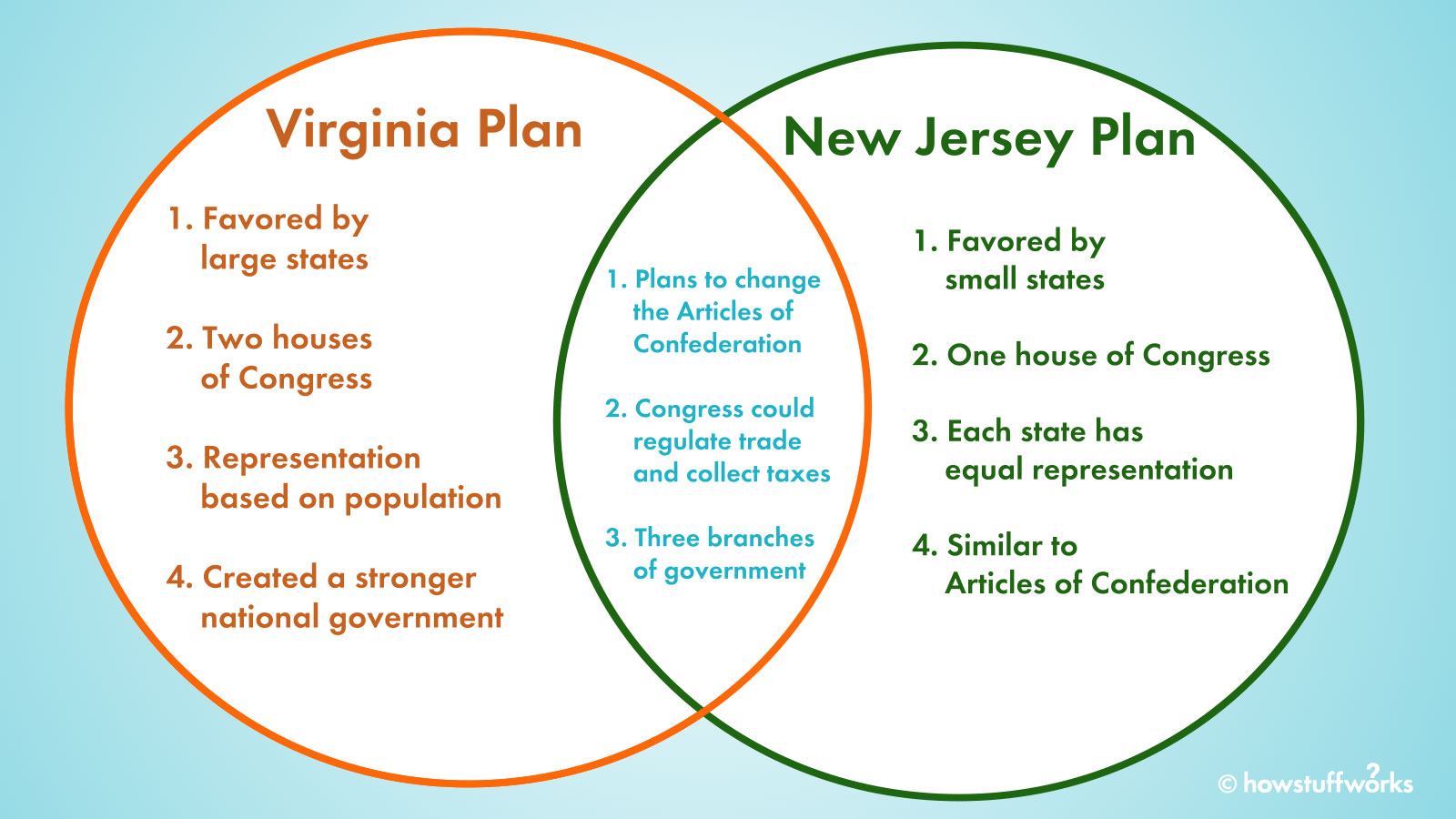Chapter 2: The Constitution
Objectives:
Explain how evolving debates about liberty led from the Revolutionary War to the Constitutional Convention.
- The goal of the Revolutionary War was to protect the liberties that the US was entitled to in the Declaration of Independence. The Revolution was a radical change in the principles and opinions of the people, as people were thinking what could make political authority legitimate and personal liberties secure. The Founding Fathers wanted to create a government that would protect the liberties won in the war. After the Revolutionary War, the Articles of Confederation established a national government. However there were many flaws, such as the national government being too weak. A Constitutional Convention took place to enforce a new political system, in which the national government was stronger, but state’s rights were also protected.
Discuss the major proposals and compromise over representation in the Constitutional Convention
- There were two main plans that the delegates debated over about representation: the Virginia Plan and the New Jersey Plan. The Virginia Plan proposed a legislature in which seats were allocated based on the population of states. Larger states favored this plan as they got more representation. The New Jersey Plan proposed a legislature in which all states would get equal representation. They were worried that with the Virginia Plan, small states would get overlooked. A compromise was reached in which there would be a bicameral legislature, and one chamber would have proportional representation (the House) and the other would have equal representation (the Senate).
Summarize the key issues presented by the Federalists and Anti-Federalists in ratification debates for the Constitution.
- The Federalists were in favor of ratifying the Constitution and a stronger national government, where the Anti-federalists were concerned about the national government having too much power, and were in favor of a smaller republic. They also wanted a Bill of Rights that would ensure individual liberties. They believed that a strong national government would be distant from the people. If a strong national government was needed, it should have many more restrictions.
- James Madison responded to these critics in Federalist No. 10 and No. 51. He argued that liberty is safest in large republics. In small communities, there will be few differences in opinion. In a large republic there are many opinions, so it will be hard for a tyrannical majority to form or organize. Citizens were convinced by his argument because a strong national government was essential if the nation had to stand against foreign enemies or guard against domestic relationships.
Discuss continuing debates about democracy and the Constitution.
- There are still many critics about the Constitution and all the things that it outlined about our government. One criticism is that there needs to be a reduction in the separation of powers so that the government can be more efficient. They think the separation of powers makes the President too weak. Another criticism is that the government needs to reduce their spending and federal courts hold too much power, so judicial power should be curbed.
Problem of Liberty:
- Goal of the American Revolution was liberty.
- Sought to protect liberties they were entitled to in the Declaration of Independence.
- Right to bring legal cases to independent judges, free of burden of quartering troops at home, engaging in trade without burdensome restrictions, and no taxation without representation
- During the war of 1775, opinion shifted. Colonists thought they would have to become independent if their liberties were to be assured.
- Colonials lost confidence in the English constitution. Believed that English politicians were corrupt.
- The Revolution was a radical change in the principles and opinions of the people.
- New vision of what could make political authority legitimate and personal liberties secure.
Articles of Confederation:
Each state has sovereignty and independence, one vote in congress, and delegates.
Congressional Powers:
- Borrow money from people
- Settle disputes between states on state petition
- Enter treaties and alliances
- Establish and control military, declare war, and make peace
- Create a postal system, admiralty courts, government departments, regulate Indian affairs
- Regulate coinage and set standards for weights and measures
Weaknesses:
- Congress couldn’t regulate commerce or directly tax people
- Congress couldn’t compel states to pay their fair share of taxes
- Congress lacked power to enforce the laws
- Congress couldn’t enforce foreign treaties, and state entered treaties independently
- Congress couldn’t draft soldiers or issue a single currency
Failed because the federal government was too weak

The Constitutional Convention:
Met to revise the Articles, but ended up writing a new constitution. They kept protection of life, liberty, and property in mind.
Shay’s Rebellion: 1787 Revolutionary War veterans feared losing their property to tax collectors.
- Powerful effect on opinion, because they saw that there was widespread discontent with the new government
- Many people began to worry that the country was heading for another revolution
55 delegates joined. Young but experienced.
Issue: how to have a government strong enough to preserve order but not so strong that it would threaten liberty.
Virginia Plan: Strong national government, bicameral legislature.
New Jersey Plan: Small states worried about population representation, unicameral legislature. Amendment to Articles. Representation is the same for all states.
Great Compromise:
- House of Representatives has representation based on population
- The Senate has the same representation from all states.

Ratification Debates:
- Favored a republic because the government should mediate, not mirror, popular views. Most citizens did not have knowledge about politics.
- Aristotle: Democracy can decay into an oligarchy or tyranny.
- John Locke: People exist in a state of nature, but desire for self-preservation of liberties will want them to have a government that will protect their liberties. Not necessary to have an all-powerful government.
- Thomas Hobbes: Absolute, supreme leader needed.
- Framers wanted a republic that would protect freedoms, and be a moderate regime.
- Amendments can be proposed by ⅔ vote of both houses of Congress or by a national convention called by Congress at the request of ⅔ of the states.
- Must be ratified by ¾ of the states. 27 so far survived this process.
Key Principles:
- American representative democracy is based on separation of powers and federalism
- Governmental powers divided into three:
- Enumerated: exclusively for the national government
- Reserved: exclusively for the state governments
- Concurrent: Shared by both the national and state governments.
Government and Human Nature:
- The Framers' experience with British rule and state government under the Articles shaped their views.
- People seek their own advantage in politics
- Unchecked pursuit of self-interest leads some people to exploit others
- Aristotle believed the first task of the government was to cultivate virtue.
- Good people to have a good government
- To Madison, deliberate cultivation of virtue would require a government that’s too strong
The Anti-federalist View:
- Believed that liberty could be secure in a small republic in which rulers were closely checked by the ruled.
- Strong national government would be distant from the people. Nation needed a loose confederation of states.
- If a strong national government was needed, it should have many more restrictions.
- Narrowing jurisdiction of the Supreme Court, a council that would review the president’s actions, military affairs dealt with by the states, reducing the power of Congress to levy taxes, etc.
- Madison responded to these in Federalist No. 10 and No. 51.
- Argued liberty is safest in large republics. In small communities, there will be few differences in opinion. In a large republic there are many opinions, so it will be hard for a tyrannical majority to form or organize.
- Citizens were convinced because a strong national government was essential if the nation had to stand against foreign enemies or guard against domestic relationships.
- No Bill of Rights included in the Constitution - even the Antifederalists wanted it, why?
- Constitution already contained numerous guarantees of individual liberty
- Most states had a bill of rights
- Framers thought they were creating a government with specific, limited, powers.
Need for Bill of Rights:
- Ratification was tough without a bill of rights.
The Constitution and Slavery:
- Slavery was a betrayal to “all men are created equal”
- Jefferson tried to get a clause opposing the slave trade in the Declaration of Independece
- However any effort to use the Constitution to end slavery would mean the end of the Constitution
- Three-fifths compromise - slaves were deemed as ⅗ of other people, and they would be added to the number of free people to make up the population for representation in the House
- Agreed not to allow the new government to prohibit the importation of slaves until 1808.
- Guaranteed if a slave were to escape and flee to a free state, it would be returned by that state
Economic Interests:
- Some Framers were wealthy, owned slaves, were creditors, others were not.
- Economic considerations influenced how the Framers voted on some issues, but their economic interests did not dominate the convention.
- At elected state ratifying conventions, economic factors played a larger role.
- Delegates who were merchants, in cities, and owned land, and did not own slaves were more likely to ratify the Constitution. Unlike delegates who were farmers and who did own slaves
The Constitution and Equality:
- Criticism today about the national government is too weak to resist the pressures of special interests.
- Our relationship with liberty and equality has changed since the Founding.
Reducing the Separation of Powers:
- Some say an increase in presidential Authority would make for better policies
- Critics of the separation of powers complain that this makes the President too weak.
Making the System Less Democratic:
- Argument that the government does too much.
- Democracy can produce bad results if the government caters to the special interests of the citizens rather than long term values.
- Constitutional amendment that would set a limit on the amount of money the government could collect in taxes each year.
- It would force Congress and the president to look at the big picture
- Problems arise from the growth in power of the federal courts.